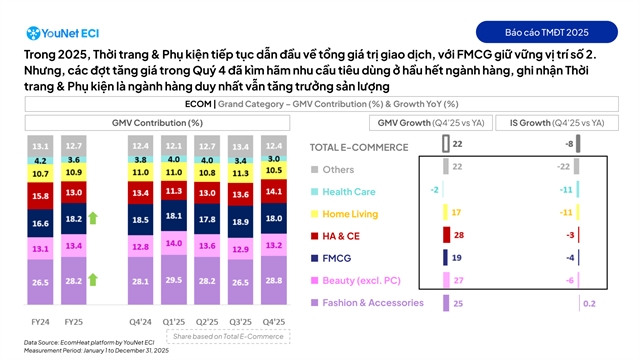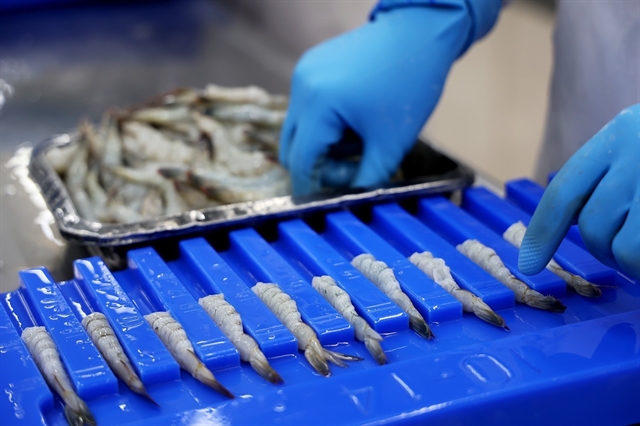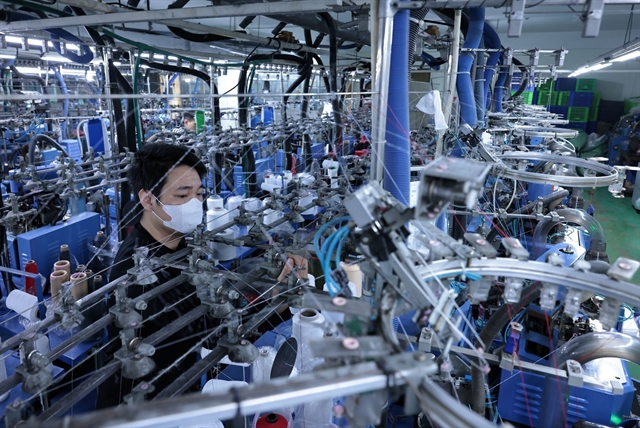 Economy
Economy

 |
| Shrimp has been processed for export products. — VNA/VNS Photo |
HÀ NỘI — The third quarter (Q3) profit picture shows a positive recovery for seafood companies, coupled with increasing export expectations in the year-end period, indicating that the industry is entering a new growth cycle.
Resuming growth in leading firms
In Q3, Vĩnh Hoàn Corporation reported a significant upturn, achieving a profit before tax of VNĐ402 billion (nearly US$16 million), an 82 per cent increase compared to the same period in 2023.
This result marks a return to positive growth since Q4 2022, which had concluded a prior growth cycle in Việt Nam’s pangasius export sector.
As a result, Vĩnh Hoàn’s cumulative profit before tax for the first nine months of 2024 has surpassed the previous year’s results.
The US remains Vĩnh Hoàn’s largest market and growth engine, with export revenue to the US reaching over VNĐ2.9 trillion, a year-over-year increase of 23 per cent. For 2024, it projects revenue of nearly VNĐ13.4 trillion, up 34 per cent, and a profit after tax of VNĐ1.19 trillion, representing a 22 per cent increase over 2023.
The company’s growth expectations are supported by anticipated end-of-year demand from US importers, who traditionally increase procurement for the holiday season.
The demand boost is expected to benefit Việt Nam’s overall seafood export value, with Vĩnh Hoàn positioned as the largest Vietnamese exporter of frozen pangasius fillets to the US, commanding a 47 per cent market share.
The firm has been proactive in expanding its product value chain to maximise by-product utilisation, enhancing operational efficiency and profitability.
Within the shrimp sector, technological advancements are enhancing farming success rates, reducing per-unit production costs and increasing profit margins.
Sao Ta Foods JSC (FMC) posted Q3 revenue of over VNĐ2.8 trillion, a 58.6 per cent increase, while net profit rose to VNĐ94.8 billion, up 6.2 per cent from the prior year.
Though profit growth trailed revenue growth due to decreased financial income and elevated selling expenses, Sao Ta’s gross profit margin saw an improvement from 10.3 per cent to 10.8 per cent.
For the first nine months of the year, Sao Ta recorded a 32 per cent gain in shrimp output alongside an 11 per cent rise in average sales prices. However, anti-dumping and anti-circumvention tariffs on US exports tempered net profit growth, resulting in only a 0.9 per cent year-over-year increase.
Minh Phú Seafood Corp also achieved a strong Q3 recovery, with revenue rising to VNĐ2.7 trillion, up 35 per cent year-over-year, and profit after tax exceeding VNĐ198 billion. This result contrasts sharply with the previous quarter’s loss of VNĐ88 billion and a loss of VNĐ13.3 billion in Q3 2023.
The company’s financial performance was bolstered by financial income of VNĐ319 billion, nearly 32 times that of the same period last year, mainly from dividends received from subsidiaries.
As of the end of September, Minh Phú’s cumulative revenue reached VNĐ6.2 trillion, a 33.5 per cent increase, while net profit rose nearly 17-fold from last year to VNĐ135 billion.
The broader seafood sector in Việt Nam has shown marked improvements as export activities strengthen.
Data from the General Department of Customs of Việt Nam indicates that seafood export revenue reached $7.16 billion in the first nine months of 2024, up 8.5 per cent. Shrimp exports have led this growth, comprising approximately 40 per cent of total seafood export value, with key markets being the US, Japan and the European Union.
Additionally, pangasius exports posted notable gains, supported by recovering demand in traditional markets such as the US and EU.
 |
| Farmers harvesting whiteleg shrimp in Bạc Liêu Province. — VNA/VNS Photo |
Screening seafood stock opportunities
Lương Duy Phước, head of analysis at Kafi Securities, predicts that the positive business momentum in the domestic seafood sector could persist into the first half of 2025. Over the next two to three quarters, seafood companies are expected to deliver favourable results.
The current valuation of seafood companies is reasonable -- not overly expensive, but no longer cheap. Therefore, for investors considering seafood stocks, industry leaders like Vĩnh Hoàn are a strong choice, Phước told tinnhanhchungkhoan.vn, highlighting that seafood stocks may be more suited to medium- and long-term investors.
Although Vietnamese seafood products face significant competition from South American and other Asian countries, a global demand recovery may enable companies to sustain growth in the coming period.
Nguyễn Tiến Dũng, head of industry and stock analysis at MB Securities, forecasts that the average selling prices for Vietnamese pangasius exporters will likely remain steady, despite a decline in pangasius fingerling prices due to increased supply and a cooling trend in feed ingredient costs.
This reduction in input costs alongside stable selling prices is expected to enhance profit margins, benefitting companies with substantial US market share.
Similarly, shrimp exporters to the US and Japan are well-positioned to benefit from growth in both volume and price.
Among pangasius producers, Vĩnh Hoàn stands out as a prime investment prospect.
Restrictions on Russian-origin seafood imports and limited Chinese tilapia supplies in the US market have positioned pangasius as a viable alternative for whitefish, sustaining positive export prospects for Vietnamese pangasius.
In the shrimp sector, Sao Ta Foods represents a notable investment opportunity.
The US Department of Commerce recently finalised anti-subsidy tariffs on warm-water frozen shrimp from Ecuador, India, Indonesia and Việt Nam, imposing a 2.84 per cent tariff on Sao Ta.
However, the company has proactively allocated VNĐ23 billion for this tax in the first nine months of 2024, Dũng said.
While Sao Ta’s profit growth for 2024 is projected to remain stable, 2025 profitability could increase by 40 per cent, supported by a 40 per cent increase in capacity at new factories, steady demand in the US and Japan, and potential reversal of anti-dumping provisions set aside in 2023. — VNS




